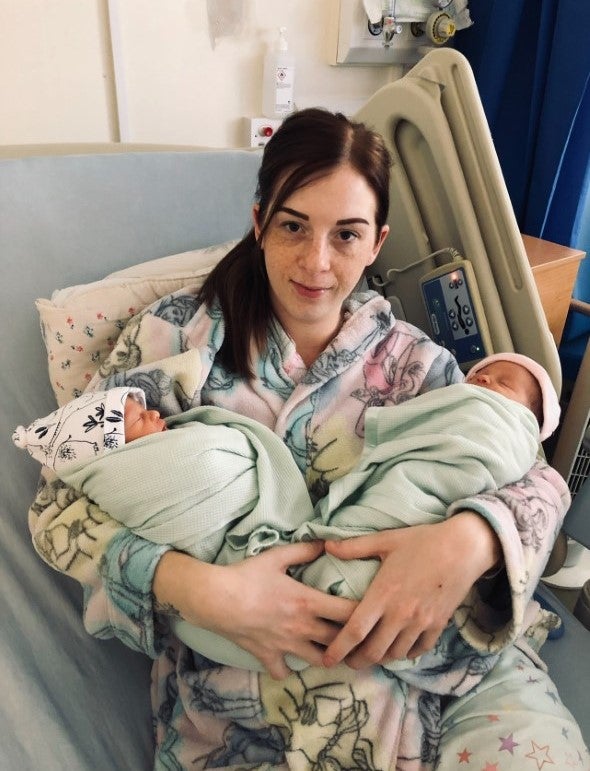Twin baby died following ‘neglect’ after hospital ‘failed to provide basic care’
‘We want the details of Kingsley’s case to be used in hospitals nationwide to prevent this from happening again’, says Tunde Olasupo

Your support helps us to tell the story
From reproductive rights to climate change to Big Tech, The Independent is on the ground when the story is developing. Whether it's investigating the financials of Elon Musk's pro-Trump PAC or producing our latest documentary, 'The A Word', which shines a light on the American women fighting for reproductive rights, we know how important it is to parse out the facts from the messaging.
At such a critical moment in US history, we need reporters on the ground. Your donation allows us to keep sending journalists to speak to both sides of the story.
The Independent is trusted by Americans across the entire political spectrum. And unlike many other quality news outlets, we choose not to lock Americans out of our reporting and analysis with paywalls. We believe quality journalism should be available to everyone, paid for by those who can afford it.
Your support makes all the difference.A baby died from “neglect” after staff failed to provide “basic medical care” and ensure he was screened for infection, an inquest has heard.
Kingsley Olasupo passed away at Royal Bolton Hospital following a catalogue of mistakes by the staff responsible for his care.
On Thursday a coroner ruled Kingsley’s death had been contributed to by neglect, and could have been avoided had he been given antibiotics for an infection earlier.
Bolton NHS Foundation Trust has already admitted to clinical negligence, as revealed by The Independent.
His parents, Tunde Olasupo and Nicola Daley have waited three years for the inquest into their son’s death to take place.
Following a four-day inquest coroner Peter Sigee found there had been “individual and systemic” failures in the post-natal care of Kingsley which meant he was not assessed or treated for an infection.
This, Mr Sigee ruled, amounted to “gross failure to provide basic medical care” and caused his death.

Mr Olasupo said: “We want Kingsley to be recognised and remembered as the baby who put new and better policies in place.
“We want the details of Kingsley’s case to be used in hospitals nationwide to prevent this from happening again. No amount of money in the world can ever replace Kingsley; our only wish is that no one else goes through what we have and are failed the way Kingsley was.
“We will not stop pushing for changes and one of the things we want to push for is a permanent memorial of Kingsley, to always remind the doctors and midwives that simple mistakes can lead to a catastrophic outcome.”
During the inquest it was found that Kingsley had several signs of an infection when he was born on 8 April with his twin Princess.
Midwives initially found meconium in his amniotic fluid; however, this was not recorded correctly later.
He was not reviewed after his birth by doctors, nor was he reviewed at regular times thererafter.
It was not until 12 April, four days after his birth, that Kingsley was screened for an infection for the first time.

Evidence found midwives did not complete appropriate sepsis charts and did not seek advice quickly enough from doctors.
By 13 April, when further infections were identified, the coroner found the infection was too far advanced and it was too late to treat him. He tragically died five days later following an unsurvivable brain injury.
The ruling found Kingsley should have been assessed by a paediatric doctor within two hours of his birth and every day thereafter.
It added that if a doctor had seen and assessed him from birth, in accordance with guidelines, they would have screened him for infection and given antibiotics within 24 hours.
Following his death, guidance on the risks of neonatal infections have been distributed by the trust, the British Association of Perinatal Medicine, the National Institute for Care and Excellence, and other bodies.
Rachael Heyes, a medical negligence solicitor at JMW Solicitors who dealt with the family’s legal case, said: “It has been clear from the start that there was a catalogue of errors in the care Kingsley received. However, in reaching his conclusions the coroner found that neglect by the hospital contributed to his death and this would have been prevented if antibiotics had been provided, which based on the overwhelming evidence obtained, is the only conclusion that could be reached.
“The family have waited more than three years for the inquest into Kingsley’s death to take place and have approached their search for answers with dignity, patience and remarkable strength. Nothing can take away the unimaginable pain that Tunde, Nicola and the whole of the family have suffered as a result of Kingsley’s death, but they have now finally had the opportunity to get answers from those directly responsible for his care.”
Ms Heyes said it is vital that Bolton NHS Foundation Trust, and other trusts, learn from the failings and that all midwives are trained on recognising the risks of infection.
Francis Andrews, medical director at the trust, said: “On behalf of the trust, I would like to offer my sincere condolences to Nicola and Tunde for the tragic loss of their little boy, Kingsley.
“We fully accept the outcome of the inquest and are truly sorry that our care fell below the standards that Kingsley, Nicola and Tunde deserved.
“We undertook a thorough and transparent investigation, and have reviewed our practices and have made significant changes.
“We will continue to do all we can to prevent such a tragedy happening again.”


Join our commenting forum
Join thought-provoking conversations, follow other Independent readers and see their replies
Comments